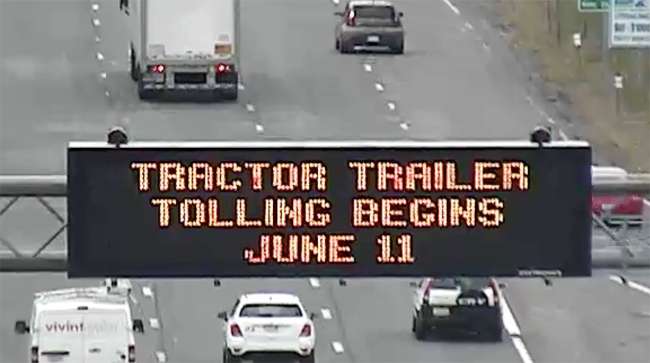Staff Reporter
Rhode Island Truck Tolls Will Start June 11

After a series of false starts, the Rhode Island Department of Transportation is set to begin its trucks-only tolling program June 11.
Rhode Island Department of Transportation Director Peter Alviti announced June 5 that two electronic tolling systems along Interstate 95 in the southern portion of the state will begin charging semitrailers June 11.
The tolling gantries will be located in Hopkinton and Exeter, both of which toe the state’s border with Connecticut. The Hopkinton toll will be $3.25, and the Exeter toll will be $3.50. The tolls are limited to one charge per facility, per day in each direction and will not exceed $40 per day.
These tolling locations are the first of 13 truck tolls that will be dispersed throughout the state.
RIDOT’s truck-tolling program has been mired in delays. The gantries were supposed to be operational in December. In November, RIDOT officials pushed the start date back to February or March. In April, the agency postponed the tolls to late May or early June.
Gov. Gina Raimondo called for truck tolling in her RhodeWorks program, which is projected to generate $4.7 billion to finance infrastructure projects such as bridge replacements and road improvements. According to RIDOT, about 22% of the 1,162 bridges in the state are structurally deficient.
Rhode Island Trucking Association and American Trucking Associations have been staunch opponents of the plan. RITA has called the truck tolls unconstitutional and said it will exhaust every legal avenue to stop them.
“RITA and its members have courageously and successfully delayed the implementation of truck-only tolls for over three years,” RITA President Chris Maxwell told Transport Topics. “We look forward to a final resolution of this matter in the courts and are hopeful that our day of reckoning is around the bend.”
According to a statement released June 5, ATA plans to file a lawsuit challenging the constitutionality of the tolls.

Pianka
Richard Pianka, deputy general counsel for ATA, explained that there are statutory limitations on states’ abilities to toll federal-aid highways. Pianka said RIDOT is relying on a provision that allows bridges and tunnels that are being reconstructed or repaired to be converted into toll facilities. The statute does not clearly define what a bridge is, but Pianka suggested it was intended to cover high-capital projects, such as large river crossings. Some of the tolling gantries included in RIDOT’s system preside over much smaller crossings, such as two-lane overpasses.
Moreover, ATA maintains that the truck tolls discriminate against interstate commerce. Pianka said that if a state charges a user fee for access to channels of interstate commerce, that fee has to be a fair approximation of use and cannot discriminate between in-state and out-of-state interests. Under Rhode Island’s toll system, a hauler within Rhode Island who needed to pass through one gantry repeatedly for dispatches would be charged far less than a trucker moving through the state who encountered multiple gantries.
Darrin Roth, vice president of highway policy for ATA, pointed out that, in charging semitrailers over trash trucks or dump trucks, RIDOT was further burdening nonlocal trucks.
“Trucks are interstate commerce. This is calculated to discriminate against interstate commerce,” Pianka said. “It doesn’t represent a fair approximation of use because cars pay zero and trucks pay not zero.”

